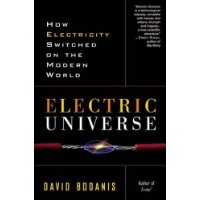| 商家名称 |
信用等级 |
购买信息 |
订购本书 |
|
|
 |
Electric Universe: How Electricity Switched on the Modern World |
 |
|
 |
Electric Universe: How Electricity Switched on the Modern World |
 |

基本信息·出版社:Three Rivers Press
·页码:320 页
·出版日期:2006年02月
·ISBN:0307335984
·条形码:9780307335982
·装帧:平装
·正文语种:英语
内容简介 In
Electric Universe, David Bodanis weaves tales of romance, divine inspiration, and fraud through a lucid account of the invisible force that permeates our universe. In these pages the virtuoso scientists who plumbed the secrets of electricity come vividly to life, including familiar giants like Thomas Edison; the visionary Michael Faraday, who struggled against the prejudices of the British class system; and Samuel Morse, a painter who, before inventing the telegraph, ran for mayor of New York on a platform of persecuting Catholics. Here too is Alan Turing, whose dream of a marvelous thinking machine—what we know as the computer—was met with indifference, and who ended his life in despair after British authorities forced him to undergo experimental treatments to “cure” his homosexuality.
From the frigid waters of the Atlantic to the streets of Hamburg during a World War II firestorm to the interior of the human body,
Electric Universe is a mesmerizing journey of discovery by a master science writer.
作者简介 David Bodanis has taught intellectual history at Oxford and is the author of several books, including
The Secret House and
E=mc2. A native of Chicago, he lives in London.
编辑推荐 Review “A technological odyssey complete with heroes and villains, triumph and tragedy—a true scientific adventure.” —Simon Singh, author of
Big Bang“Though science is omnipresent in
Electric Universe, it’s only part of the literary equation. Living, breathing, laughing, loving, vainglorious, extraordinarily gifted humans get plenty of ink as well.” —
Chicago Sun-Times“Anyone who has considered the inner workings of a computer (or even a toaster) would get a charge out of Bodanis’s history of electricity. . . . [He] adds more than a touch of drama to his lucid and informative science lessons.” —
Entertainment Weekly“Hugely impressive. No one makes complex science more fascinating and accessible—and indeed more pleasurable—than David Bodanis.” —Bill Bryson
文摘 Part I: No WiresWhen the universe was very young, in the first moments after the Big Bang, powerful charged electrons began to pour out of the swirling furnace that filled empty space. Many became part of simple hydrogen atoms that tumbled through the cosmos and ended up within huge stars.
In their long sojourn within the stars, and then even more when the stars blasted apart, multitudes of those simple atoms were squeezed together with such force that larger atoms were created.
Metals such as copper, iron, and silver were born.
For eons these metals, too, floated through space. In time they fell toward a new solar system, and became part of ore deposits on the North American continent. They were joined by metal atoms that had been created in other distant starbursts. Hidden deep inside each atom, as the ore lay buried, powerful electron charges remained.
Mountains rose and fell. Giant reptiles hunted in fern forests; ecosystems changed, and giant mammals hunted in coniferous and broad-leaf forests. Small groups of arrow-using humans arrived from Asia; thousands of years later, more humans arrived, on giant floating vessels from Europe and Africa. There were cruel frontier wars, and new settlements arose. The soil was turned over for planting, and probed for metal ore. The hidden electrical charges, unchanged for billions of years, were about to be released.
1: The Frontiersman and the Dandy: Albany, 1830, and Washington, D.C., 1836Joseph Henry was a strapping, rawboned American from the distant reaches of the frontier state of New York, who by the age of thirty had left jobs as a handyman (too boring), a builder (too low paid), a metal worker (too hot), and then, most disastrously, a surveyor, where he’d let himself be talked into leading a crew for several winter months through the forests toward the Canadian border (far, far too cold). In 1826, freshly back from the surveying and miraculou
……




